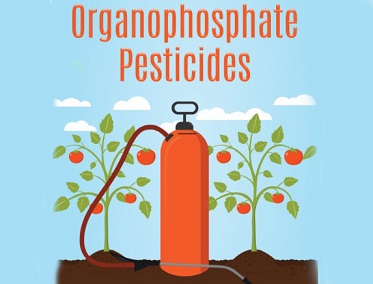Scientists from University of California Discover Higher COVID-19 Risk with Organophosphate Pesticide Exposure
Nikhil Prasad Fact checked by:Thailand Medical News Team May 25, 2024 1 year, 4 months, 3 weeks, 2 days, 14 hours, 48 minutes ago
COVID-19 News: The COVID-19 pandemic has revealed numerous factors that can influence the severity and susceptibility to SARS-CoV-2, the virus responsible for COVID-19. Among these factors, environmental exposures have come under scrutiny. Research has shown that exposure to various environmental chemicals, particularly air pollutants, can exacerbate the risk and outcomes of SARS-CoV-2 infection. However, the link between organophosphate (OP) pesticides, commonly used in agriculture, and COVID-19 risk has remained unexplored until now.
 Scientists from University of California Discover Higher
Scientists from University of California Discover Higher
COVID-19 Risk with Organophosphate Pesticide Exposure
The CHAMACOS Study
The Center for the Health Assessment of Mothers and Children of Salinas (CHAMACOS) Study, a longitudinal cohort study, provided the framework for this groundbreaking research that is covered in this
COVID-19 News report. This study focuses on families from the Salinas Valley, a region in California known for its intensive agriculture. The cohort includes young adults aged 18 to 21, who have been tracked from early childhood. This unique population offers valuable insights into the long-term effects of pesticide exposure.
Measuring Pesticide Exposure
To assess the impact of OP pesticides, researchers used two distinct measures of exposure. The first measure involved urinary biomarkers from 154 participants, reflecting exposure from the prenatal period to age five. The second measure assessed residential proximity to OP pesticide applications for 292 participants, spanning exposure from in utero to age 16. These comprehensive exposure assessments provided a robust basis for evaluating the relationship between OP pesticides and SARS-CoV-2 infection.
Antibody Testing for COVID-19
The study utilized antibody data to determine past SARS-CoV-2 infections. Blood samples collected between June 2022 and January 2023 were tested using enzyme-linked immunosorbent assays (ELISAs) designed to detect antibodies against different SARS-CoV-2 antigens. This method allowed researchers to identify participants who had been previously infected with the virus, regardless of their vaccination status.
Study Findings
The findings of the study were both intriguing and concerning. Researchers found increased odds of SARS-CoV-2 infection among participants with higher urinary biomarkers of OP pesticides. Specifically, those exposed in utero had an odds ratio (OR) of 1.94, while those exposed from age 0-5 had an OR of 1.90. Although the confidence intervals for these estimates were wide, indicating some uncertainty, the results suggest a potential link between early-life OP exposure and increased COVID-19 risk.
Population Characteristics
The study population was predominantly Latino (97.6%), reflecting the demographics of the Salinas Valley. Participants ranged in age from 19 to 21 years, with significant proportions living below the poverty line (43.1%) and in crowded housin
g conditions (48.0%). Despite these challenging socioeconomic conditions, 64.6% of participants had received at least one dose of a COVID-19 vaccine. The high rate of past SARS-CoV-2 infections (49.8%) among both vaccinated and unvaccinated individuals underscores the vulnerability of this population.
Discussion and Implications
The study's findings contribute to the growing body of evidence linking environmental exposures to COVID-19 outcomes. While previous research has highlighted the role of air pollution in exacerbating COVID-19 risk, this study suggests that OP pesticides may also play a role. The almost doubling of risk associated with higher urinary concentrations of OPs during pregnancy and early childhood warrants further investigation.
However, the study also faced limitations, including a small sample size and potential confounding factors. Despite these limitations, the results underscore the need for continued research into the health impacts of pesticide exposure, particularly in vulnerable populations like agricultural communities.
Conclusion
The discovery of a potential link between OP pesticide exposure and increased COVID-19 risk highlights the importance of addressing environmental health hazards. As the world continues to grapple with the COVID-19 pandemic, understanding and mitigating factors that contribute to infection risk is crucial. This study from the University of California, Berkeley, underscores the urgent need for policies and interventions to protect communities from harmful environmental exposures and improve public health outcomes.
The study findings were published in the peer reviewed journal: Environmental Research
https://www.sciencedirect.com/science/article/abs/pii/S0013935124011198
For the latest
COVID-19 News, keep on logging to Thailand Medical News.
Read Also:
https://www.thailandmedical.news/news/toxic-substances-like-pesticides-or-vocs-at-10,000-times-lower-concentrations-may-still-affect-individuals
https://www.thailandmedical.news/news/breaking-canadian-study-alarmingly-finds-that-commonly-used-farm-pesticide-chlorpyrifos-is-linked-to-obesity-crisis-in-most-countries
https://www.thailandmedical.news/news/spices-sold-under-indian-brands-mdh-and-everest-found-to-contain-carcinogenic-pesticide-ethylene-oxide-and-are-being-banned-in-many-countries
https://www.thailandmedical.news/news/us-immigrants-from-india-at-higher-risk-of-diabetes-due-to-previous-exposure-of-pesticide-ddt-in-india
